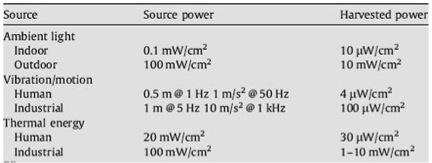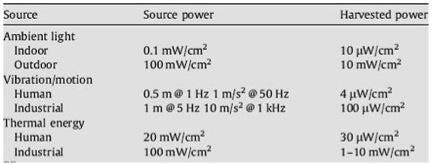Using Energy Harvesting to Power MCUs and FPGAs
April 22, 2015

Energy harvesting in particular seems to be moving at an accelerating pace. We now seem to be at a point where it is possible to run low-power systems primarily from energy harvesting sources. This is a big shift from even just a couple of years ago.
Three key trends seem to have accelerated this dramatic shift. The first is the wild growth in the low-power market. New applications like wearable devices, smart sensors, and disposable devices are driving the insatiable need for more processing power on a low-power budget.
This rapidly growing market drives the second trend: the availability of low-power MCUs and FPGAs. These devices now offer considerable, power-efficient processing that can be applied to the wide range of applications in the growing low-power market. The third trend is the growing availability of energy harvesting sources that produce enough power to run low-power MCUs and FPGAs for enough time to do useful work.
MORE FROM DESIGN NEWS: How Low Can You Go? Getting the most out of Low Power MCUs
Shown in Figure 1, below, is a summary of the power harvesting capabilities of three common harvesting technologies. We are all familiar with solar power as an energy harvesting technology, and it has probably been the main energy harvesting technology to power electronic devices up to this point.
But new technologies that provide alternative -- and often more convenient power sources - have been developed. Piezoelectric effects, for example, can be used to harvest energy from vibration, motion, and pressure. This can be convenient for powering a variety of devices in areas such as wearable electronics for athletics and sensors on trucks or trains and for material flow control.
A piezoelectric energy source, as with many harvested energy sources, can be derived in bursts, which often need to be stored and accumulated for later use. In very simple systems, a simple capacitor storage system may be sufficient to give a very low-power MCU the juice needed to power up and perform simple calculations several times a second.
Smart use of the MCUs' low-power states is usually critical in low-power applications, and newer MCUs can sleep indefinitely while using only microamperes of current, which makes it possible to use them in these types of very low-power applications.

Perhaps surprising is the large amount of harvested power available from thermal energy. On par with solar harvested power, thermal energy can perhaps be best used in industrial applications where sensors monitor extremes of pressure and temperature.
The large temperature gradients available in industrial process control applications can easily power low-power FPGAs to implement very complex sensing algorithms using digital signal processing filtering or transform functions. Small rechargeable batteries can be used to store power when the temperature gradient isn't available, but because sensing is normally only required while temperature extremes exist, batteries can be small without impacting sensor availability.
MORE FROM DESIGN NEWS: Can You Optimize this Example MCU-Based Design for Low Power Operation?
Perhaps even more interesting is the possibility of harvesting small amounts of thermally produced energy when temperature differences are not as extreme. A wearable device, for example, might have available a 10- or 20-degree temperate difference. This might be sufficient to generate enough power over just a few hours to power an activity monitor, heart rate sensor, or position tracker.
A small wristband could provide enough area to generate the power required to run a monitor or sensor. Combining energy harvesting techniques, thermal and vibration for example, could be an even more efficient method for powering an activity monitor.
If you are considering energy harvesting as a possible power source in your next design, or if you are just interested in the capabilities these technologies could provide for MCU- and FPGA-based designs, join me at my upcoming Design News Continuing Education Center online class, Designing Low Power Systems using Battery and Energy Harvesting Energy Sources, May 4-8. It will inspire you to design the next big thing in wearable devices or the Internet of Things.
Warren Miller has more than 30 years of experience in electronics and has held a variety of positions in engineering, applications, strategic marketing, and product planning with large electronics companies like Advanced Micro Devices, Actel, and Avnet, as well as with a variety of smaller startups. He has in-depth experience of programmable devices (PLDs, FPGAs, MCUs, and ASICs) in industrial, networking, and consumer applications and holds several device patents.
Design engineers, New England's premier design and manufacturing event, Design & Manufacturing New England, will take place in Boston, May 6-7, 2015. A Design News event, Design & Manufacturing New England is your chance to meet qualified suppliers, get hands-on with the latest technologies, be informed, and expand your network. Learn more here.
About the Author(s)
You May Also Like



